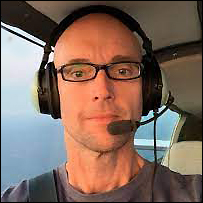Kevin Warren, research associate professor of electrical engineering, died Wednesday, June 22, in a helicopter crash in the West Virginia mountains.

Warren, 51, was one of six passengers on a tour aboard a Vietnam era Bell UH-1B Huey chopper during its last planned flight at an annual reunion for helicopter enthusiasts where he served as a volunteer. The vintage chopper crashed just miles northeast of the Logan, West Virginia airport. All six people aboard were killed.
Warren was actively involved in general aviation and held commercial pilot certificates for single/multiengine aircraft and helicopters. He also was a certified flight instructor at Wingman Flight Academy in Dickson, Tennessee and a member of the Lebanon Flying Club.
At Vanderbilt, Warren earned master’s degrees in chemistry, ’97, and electrical engineering, ’99, and a Ph.D., ’10, in electrical engineering. He joined the Institute for Space and Defense Electronics as a senior research engineer in 2003 and assumed his faculty role in 2020.
At ISDE, Warren performed extensive research into the development and application of novel radiation effects related error rate prediction methods for microelectronics in terrestrial, atmospheric and space environments. These methods have been applied to predicting the in-flight performance of radiation hardened memories, field programmable gate arrays, and custom application specific integrated circuits for the defense, civilian space and medical industries.
His research not only focused on the development of the methods and tools for error rate predictions, but also the ground-based testing methods needed to calibrate the models. He worked on the integration, development, and application of space environment models with an emphasis in magnetospheric transport of galactic cosmic ray ions.
Warren served as primary author or coauthor on numerous papers related to the analysis of semiconductor devices and their response to radiation environments and delivered short courses for conferences and private and corporate entities.
Prior to joining ISDE, Warren worked as a component engineer for Raytheon ITSS at NASA’s Marshall Space Flight Center during early development phases of the International Space Station, providing radiation effects support for the Microgravity Research Program. He also served as a component test engineer as well as a radiation effects engineer at the Johns Hopkins University Applied Physics Labs primarily supporting the Messenger and Contour spacecraft programs.
Warren was a resident of Franklin, Tennessee. He is survived by his wife, Tessa Atkins Warren, and two sons Rafe, 13, and Cael, 12, his parents, a brother and a sister. In lieu of flowers, his family requests that donations be made in Warren’s honor to the Wounded Warrior Project.
A memorial service will be held at Currey Ingram Academy on Saturday, Aug. 20, 2022.
Contact: Brenda Ellis, 615 343-6314
brenda.ellis@vanderbilt.edu